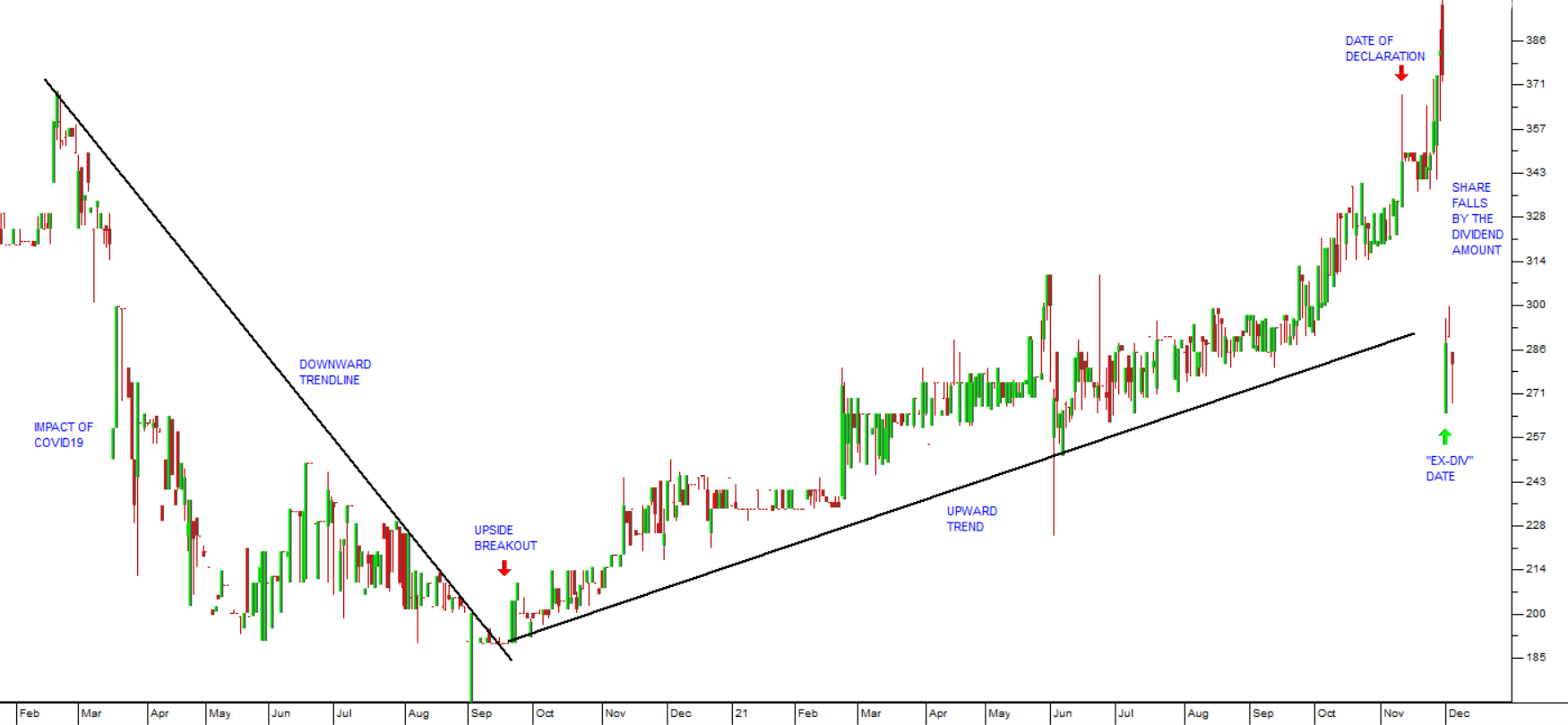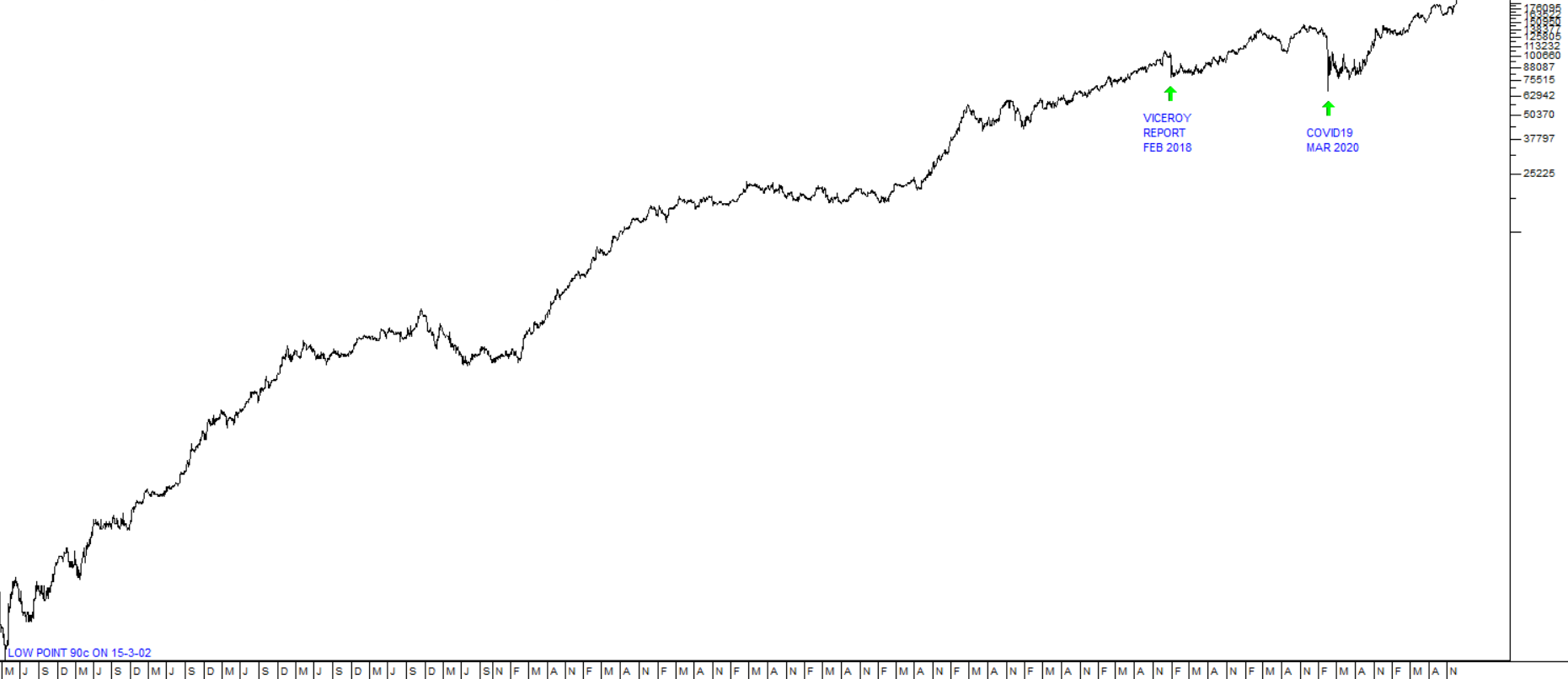Dividends
6 December 2021 By PDSNETThree weeks ago, on 15th November 2021, we published an article about Grand Parade (GPL) in which we drew attention to the fact that it had broken up through its long-term downward trendline and was now in a new upward trend. We suggested that this made it worthy of your attention as a private investor. What we did not mention was the impending special dividend which the directors of Grand Parade had declared.
This dividend was announced on the stock exchange news service (SENS) on 11th November 2021. It was to be 88c per share from which, of course, would be deducted dividend withholding tax (DWT) of 20%. This meant that shareholders would actually only receive 70,4c on the date of payment which was 6th December 2021.
When a dividend is declared there are normally 5 dates associated with it:
- Date of declaration – when the board announces how much the dividend will be and when it will be paid.
- The cum div date – which is the last date on which you can buy the share in order to receive the dividend.
- The date of record – three days after the “cum div” date because the JSE operates on T+3 – which means that transactions made take three days to be registered in the company’s share register.
- The ex-div date which the first date on which buyers of the share will not get the dividend.
- The date of payment – which is usually a few days after the record date.
In the case of Grand Parade’s special dividend, The “ex div” date was Wednesday 1st December 2021 and on that day the share price fell by exactly the amount of the dividend – which is quite normal, but can be very scary for beginners in the share market. The logic is simple – if you bought the share on the “cum div” date (or before that) you got the dividend and if you bought it the next day (the “ex-div” date) you didn’t – so on the “ex-div” date the share was worth exactly the dividend less than it had been the day before. Consider the chart:

Here you can see that, following its upward break through its downward trendline, Grand Parade has been climbing steadily. The declaration of the special dividend caused the share to rise further after it was announced, but then, when it went “ex-div” the share fell by the dividend amount (88c).
If you were using a stop-loss strategy, then this fall might well have taken the share price down through your stop – and so the correct procedure is to reduce your stop by the amount of the dividend on the “ex-div” date to avoid selling the share unnecessarily.
Most investors do not pay much attention to the dividends offered by listed companies. They are more interested in capital gains. They are motivated to buy low and sell high to make a profit. But it is the market’s shifting perception of the future dividends of a company that creates the opportunity for capital gain. Allow me to explain this more clearly:
Let us consider a blue-chip share like Standard Bank. This is a share which has been listed for decades and which is very unlikely to be liquidated anytime soon. Its longevity and enormous stability means that, effectively, the only financial reward that shareholders will get from holding the share is the dividend.
A single Standard Bank share might change hands, let us say, 500 times over a period of 10 years, being bought and sold again and again in the secondary market by different investors for higher and lower prices. However, the only new money that can enter that pool of investors is the dividends. Therefore, if you can sell your Standard Bank shares for more than you paid for them, it is because the person who buys them from you has a higher perception of the future flow of dividends to accrue to that share than you had when you bought them.
In other words, a capital gain really just represents a shift in the market’s expectation of future dividends. Once you understand this, you will have a whole new appreciation for the potential of listed companies to generate dividends.
This is especially true when you also understand that the South African Revenue Services (SARS) has stated that, if you hold a share for 3 years or longer, any appreciation will definitely be treated as a capital gain for tax purposes. This means that, if you hold your shares for 3 years, SARS will deem you to be an investor rather than a dealer and your effective tax rate will be about 18%. On the other hand, if you hold a share for less than 3 years you could be declared to be a “share dealer” – in which case your capital gains will be added to your taxable income and that means you could pay as much as 45% of your capital gain in tax.
So, when I am considering a share, I always ask myself where I expect that share to be in three years time, because I don’t want to be taxed as a share dealer.
DISCLAIMER
All information and data contained within the PDSnet Articles is for informational purposes only. PDSnet makes no representations as to the accuracy, completeness, suitability, or validity, of any information, and shall not be liable for any errors, omissions, or any losses, injuries, or damages arising from its display or use. Information in the PDSnet Articles are based on the author’s opinion and experience and should not be considered professional financial investment advice. The ideas and strategies should never be used without first assessing your own personal and financial situation, or without consulting a financial professional. Thoughts and opinions will also change from time to time as more information is accumulated. PDSnet reserves the right to delete any comment or opinion for any reason.
Share this article:

